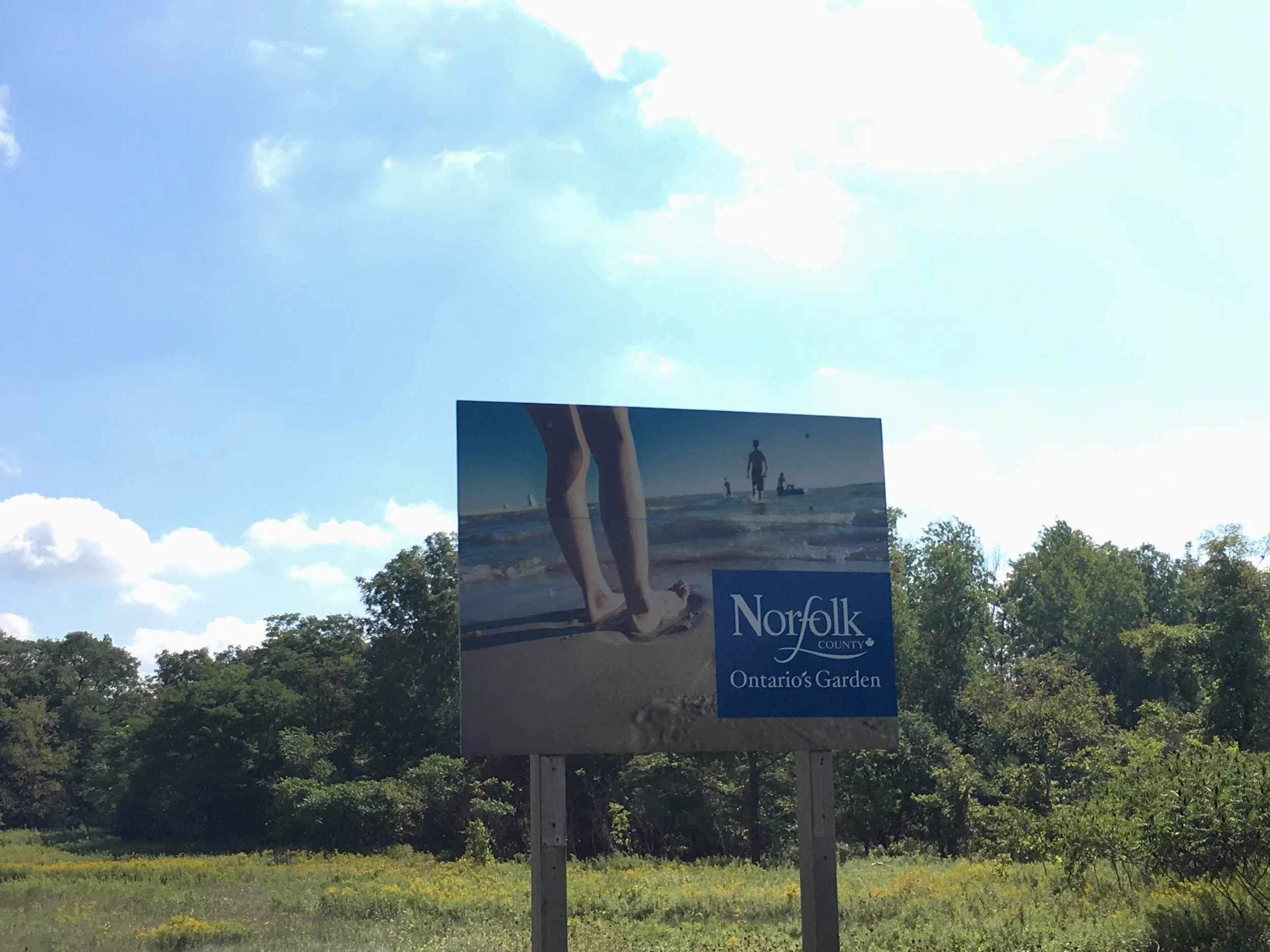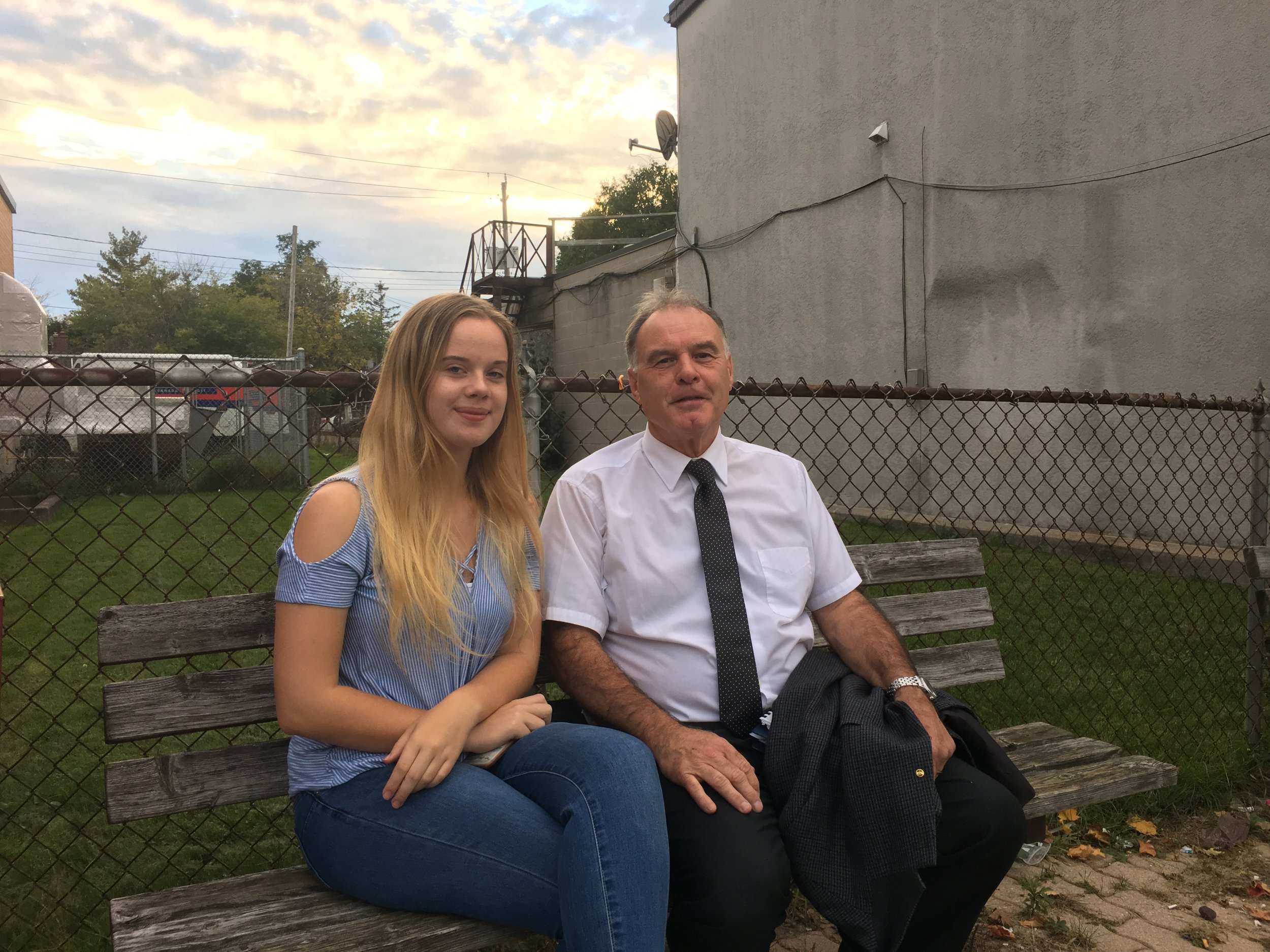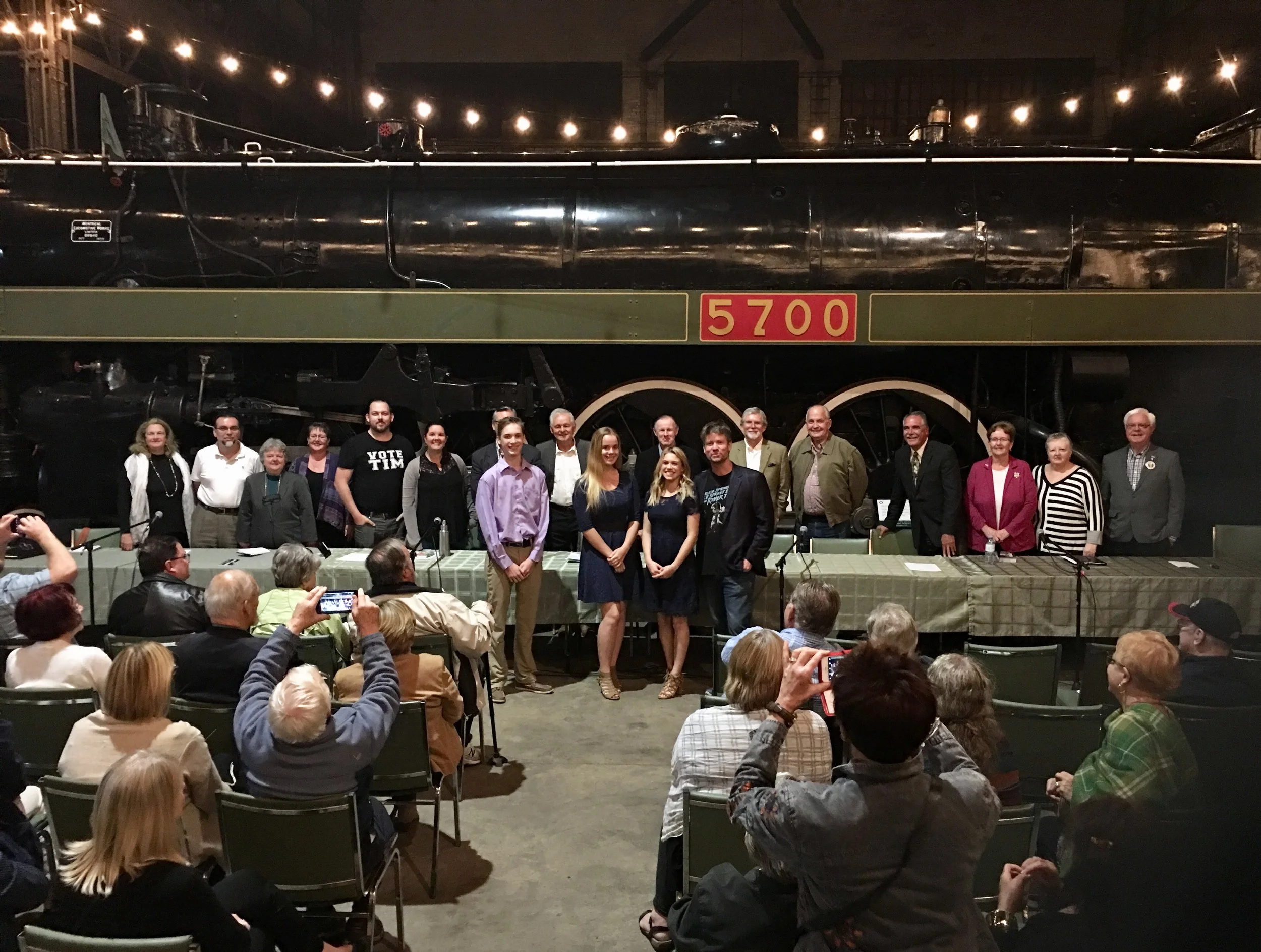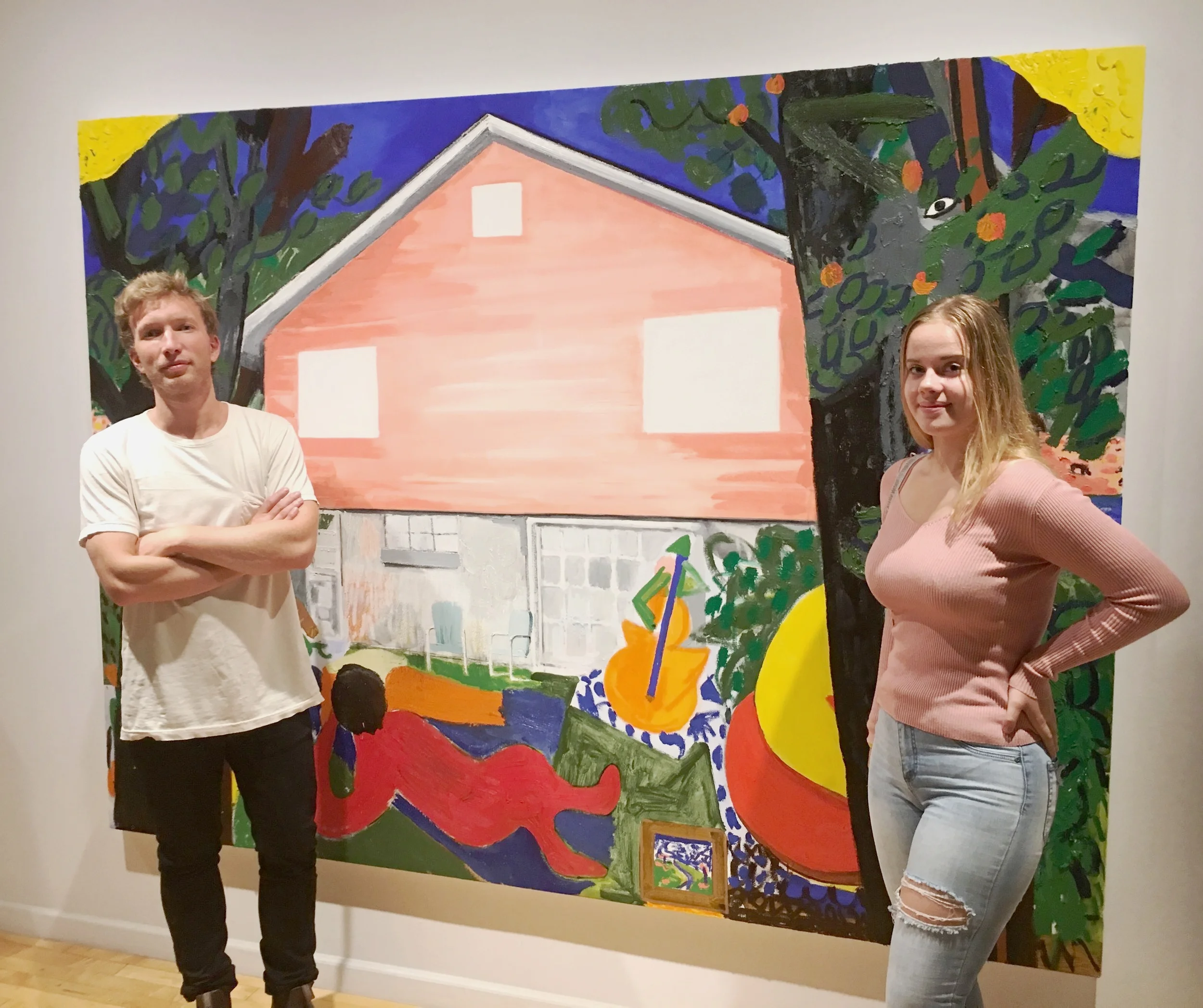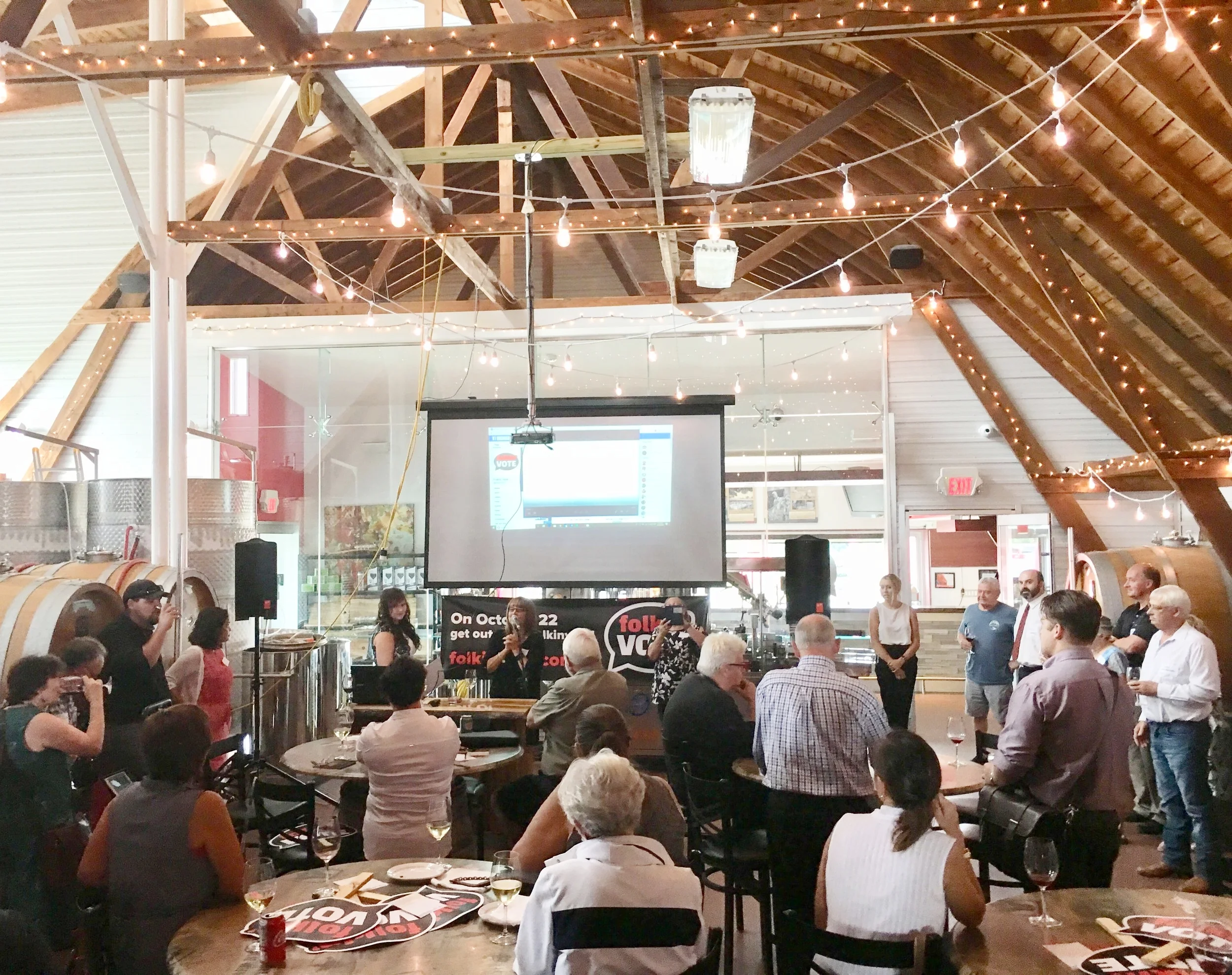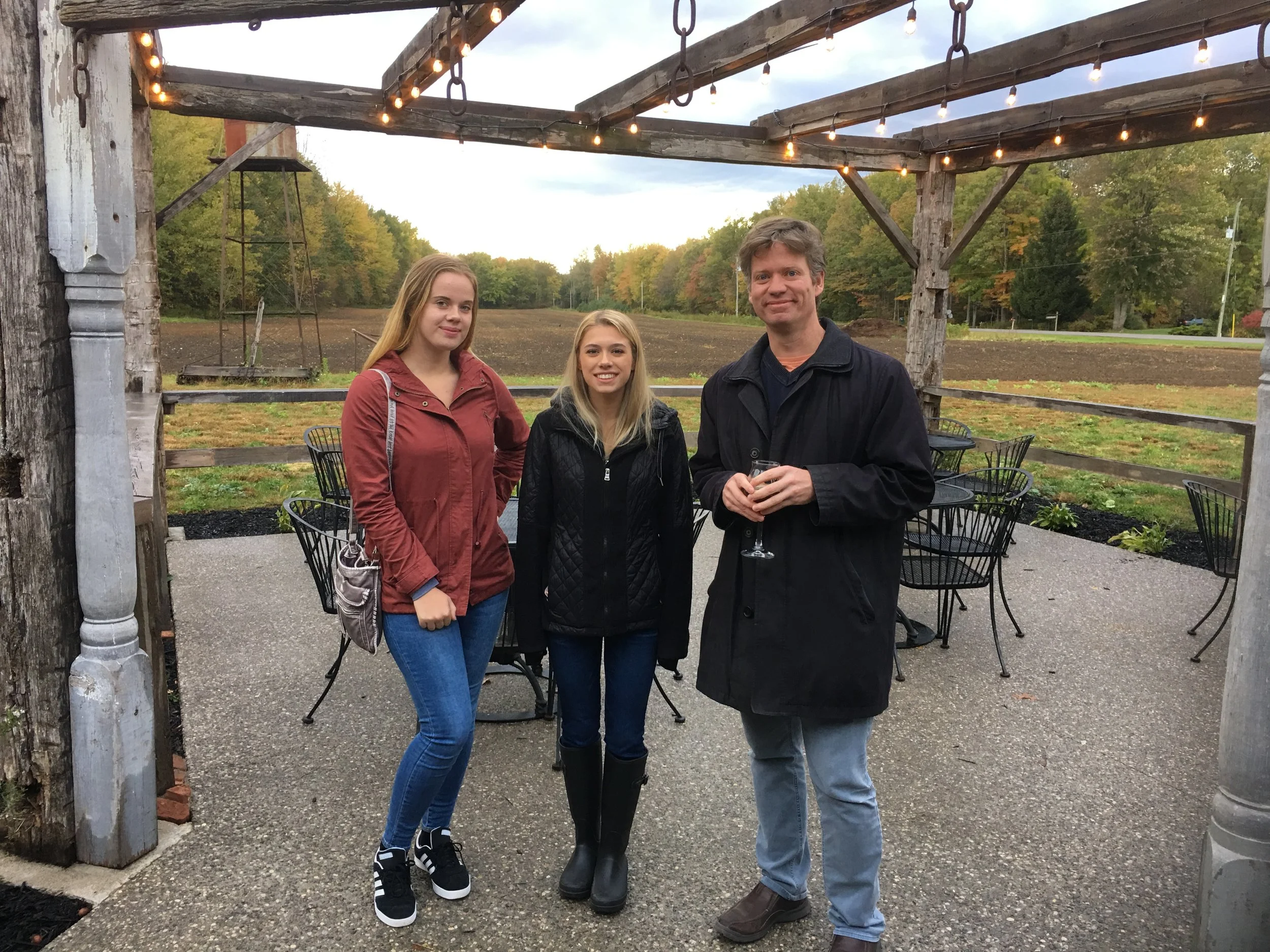Two Interviews: Charlie Luke and Kristal Chopp
Recently our owner and editor Andrew Gunn and young journalist Jenn Klassen had the opportunity to interview Charlie Luke and Kristal Chopp, the two front-runners in the race to become Mayor of Norfolk County. The questions posed to both candidates were essentially the same, but the interviews were conducted separately. With the election coming up on Monday, October 22nd, we present the two interviews in full below for our readers to consider.
Charlie Luke has been Mayor of Norfolk County for the past four years and has served as a Member of Council in the community for over thirty years. He combines this experience with his lengthy career in education as a teacher and school principal. Scan his campaign website and you discover his list of priorities for the community, including revitalizing downtown areas, boosting access to high speed internet, improving recreation facilities, changing the culture of the municipality to enhance customer service, and attracting investment.
Kristal Chopp may be new to municipal politics, but her education and career-to-date are certainly impressive. She holds a degree in Engineering from McMaster University, an MBA from the Ivey Business School at Western University, and a doctorate in law from Western as well. Currently, she works as an airline pilot. Her campaign website is direct, highlighting her desire to ‘Chopp the Red Tape’ to ensure that overregulation does not deter investment in Norfolk, and also ‘Chopp the Inefficiencies’ by spending carefully and increasing transparency.
This particular race for Mayor has been frequently bitter in tone. Luke and Chopp have taken aim at each other pointedly on social media and at a series of public meetings. It is expected, of course, that candidates will clash at times over policy matters, or hold competing visions for the future. One interesting factor has been the consistent presence in the campaign of the former Mayor of Norfolk County, Dennis Travale, who lost to Luke in 2014. Travale has inserted himself into the scene by supporting Chopp and repeatedly taking aim at Luke via social media. Casual observers may be left wondering what precise role Travale has, if any, in the Chopp campaign. We asked her about this in our interview, and the answer is illuminating.
We should note, of course, that there is a third candidate in the race, Russell Colebrook. The sixty-one-year-old former taxi driver has been calm and gracious at public meetings, and definitely has provided a refreshing perspective. We did not have an opportunity to speak with him, but the team at the Simcoe Reformer recently published a Q&A, which you can find here.
There seems to be considerable frustration and a genuine appetite for change in Norfolk County. Residents have come out in impressive numbers to multiple public forums. There are several festering issues in the community, like the deterioration of downtown areas and the decline of existing recreation facilities. Specific projects, like the repair of Misner’s Dam and the restoration of Silver Lake in Port Dover, seem to be perpetually stalled. Interestingly, all this has been gently moved to the forefront during the campaign by an organization called ‘Folkin’ Vote’, which is described as a ‘non-partisan, unaffiliated group created by active and engaged community members’ including Meika Matthews, Gail Bouw, Chantal Zorad, Claire Senko, Karen Matthews, and Carrie Sinkowski. The stated goal of ‘Folkin’ Vote’ is to help citizens engage in the election, learn about the candidates, and ultimately get out and vote.
Regardless of the perspective of any single individual or group, one could argue that this election revolves around the sense that Norfolk County needs to take a meaningful step forward. How can this small, rural community realistically compete against other communities for investment if the community often appears to be divided and competing against itself?
Look around Norfolk and one can see the successes and potential of an incredibly diverse agricultural community, a growing tourism sector, a collection of manufacturing and food processing businesses, and a small but impressive arts community (that, for some reason, has not really been talked about or elevated during this election cycle). Strong leadership is required to move Norfolk County forward. There is a need for the County to invest in technology, education, and amenities to attract and retain students, young entrepreneurs and families. For the growing population of seniors in the community, recreation and wellness facilities need to be updated. Which candidate for Mayor will voters trust to perform the job?
Here are the interviews … both were conducted on Wednesday, October 10th in Waterford. Please note that we have lightly edited the transcripts to improve readability.
Our young journalist Jenn Klassen recently spoke with Kristal Chopp, one of the candidates for Mayor of Norfolk County.
KRISTAL CHOPP
Y&FP: How has Folkin’ Vote shaped the campaign so far?
KC: Well, I think that initially – I don’t know if you know the backstory about my building and how I had painted a politically-inspired art mural on the side of it. I did that because it was an issue that wasn’t affecting just me; the more that I travelled around Norfolk County, the more that I realized the bureaucracy in Norfolk County was affecting a far larger group, and I wanted to see change. I thought that it was a way to get people talking about the problems in Norfolk County. So, I think that that really helped to start things off and got the discussion going.
When the girls started Folkin’ Vote, I mean the engagement this year has just been incredible. I’ve never seen anything like it around here in municipal politics. Of course, you know at the Dover all-candidates night, you couldn’t even get tickets to get in there! There were eight hundred people. They’ve all been incredibly well turned-out. They’ve taken the time to get these debates aired so that people are able to see them, if they’re not able to attend, and so on. And I know that people are sitting at home and they are going through them because I get messages about it all the time. I think it’s a wonderful thing that they’ve gone and done.
Y&FP: In London – we’ve been following the campaign in London a bit – they have a ward system. In St. Thomas, it’s not – it’s an at-large system. So, we notice a lot of conversation here on how to manage this in Norfolk, because there is a ward system, kind of a legacy of what was here previously. If you just had a blank slate to decide how you were going to represent the different areas within Norfolk, what would you do? Would you stay with the current system, or would you build something quite different?
KC: This was actually a question that was posed by Folkin’ Vote just last week. There were a number of people who didn’t answer it, and I can understand – the way the question was posed, it’s very challenging. Do I think that we need to eliminate this attitude of ward-against-ward? Absolutely. However, do I believe in the preservation of our local identities in the various villages and townships and hamlets around Norfolk County? Definitely. What I would hate to see is that, if you completely eliminate wards, you typically will have representation from the most populated areas, and you won’t get that same representation spread across the County. So, I think it’s a really fine balance.
Do I think that we should eliminate the ward systems in terms of elections? No, I don’t, to ensure that representation. You might have heard little bit about Port Dover, for example. Port Dover is growing, and rather than add a second councillor in Port Dover, they shifted the ward boundary line. I would have preferred to see that representation – those people have always voted, they have always been part of Port Dover, and I would have preferred to see that representation stay in Port Dover and Port Dover have a bigger representation, as they should, because it’s growing. But I think it’s going to come down to leadership, and leadership to guide the new Council to ensure that we do away with this ward-against-ward mentality because ultimately Norfolk County is going to be better when we all start working together.
Y&FP: So basically, you would keep the ward system in place for elections but maybe tweak it if necessary, but really try and smooth out the relationships between the wards …
KC: Absolutely, absolutely …
Y&FP: The ‘Community Hub’ project – obviously, one of the other key issues here – if you’re elected, what are the first steps toward either going down that road to the ‘Community Hub’, or somehow providing a solution that improves the recreational facilities and maybe boosts post-secondary education through Fanshawe down here. What would be your immediate steps in that?
KC: First of all, Norfolk’s financials are not in that great of shape; in fact, I think they’re in a lot worse shape than most people realize. So, the economic case, as I have maintained throughout this campaign, needs to be there in order to be able to justify this. To my knowledge, the repairs to the four facilities in Simcoe are in the vicinity of $12 million, from the last staff report. If we can go out and get provincial and federal funding, why would we want to lose that somewhere else? Let’s take that money and combine it with the money that would have gone into simple band-aid repairs. I think the benefits to the community could be immeasurable.
I don’t know enough about the link with Fanshawe, what has gone on already, but it is certainly something that I would absolutely love to learn more about. I think that having Fanshawe here and expanding Fanshawe could be a huge opportunity, particularly an agricultural college for Norfolk County.
Y&FP: On Twitter specifically, I have noticed the former Mayor, Dennis Travale, advocating on your behalf quite a bit. Has that been helpful for you?
KC: Absolutely. I met Dennis after I entered into the race – never met Dennis before. He approached me. We got together for coffee. He has been fantastic at providing background information, the history on some of the issues.
My opponent is using it as a knock against me. I think that it should be obvious from my background that I didn’t get where I am today with Dennis Travale, and I can make up my own mind on what things I believe in and what I don’t. Dennis is far from the only person that has provided me guidance along the way, a number of other long-standing locals and so on that know the history here – and that’s how you learn. You learn by getting out and talking to people, and getting as much background information as you possibly can.
Y&FP: You live in Dover, right?
KC: I’ve been in Dover for I guess about almost three years now. I grew up on a farm in Binbrook, so about thirty minutes away. Not that different. It’s not that I’m coming from the other side of the country. I’ve been around Dover my whole life. …
Y&FP: Imagine there is a scenario where there is no red tape involved. You have an unlimited amount of money, there is nobody stopping you from doing it … what is one dream project that you would do? There are absolutely no limits …
KC: Myself personally?
Y&FP: Your dream project for Norfolk …
KC: So, this is with my own property, my own business, or this is a County-wide initiative?
Y&FP: County-wide … you are the Mayor, you have unlimited funds, there is nothing stopping you, this is your project, whatever you want to do …
KC: Oh, that’s a tough one! Hmmm … I mean, I can think of a million projects that I would like to see go on here, but not from the County approaching them – from small business owners being given the opportunity to be able to pursue this type of thing. If I had unlimited funds, I would love to see more grants. Norfolk County does have several grants available, façade grants and these types of things. We need to get our downtowns alive and well again. As we’ve seen a shift from the younger demographic – they can’t afford to live in Toronto – the artistic crowd that has moved into Hamilton, I mean, look at how Hamilton has revitalized! If Hamilton can revitalize, anywhere can revitalize. I would like to see grants and programs for façade improvements. Let’s encourage people to come into our downtowns, and to set up businesses and get back to that village way of thinking of buy local and support local.
Jenn Klassen recently sat on a bench in Waterford, Ontario, to chat with Charlie Luke about his quest to be re-elected as Mayor of Norfolk County.
CHARLIE LUKE
Y&FP: How has Folkin’ Vote shaped the campaign so far?
CL: Well, the Folkin’ Vote – this is the first election that I’ve been involved in where there has been a very, I’ll say, public effort to engage younger voters, because obviously they’re heavy into the social media. The effort is really, really noble. It’s something that I think is money and time well-spent. It’s really difficult to say how effective it is. I mean, obviously it’s not hurting, but when you go to meet-the-candidates night, I know that in Port Dover last Wednesday [October 3rd], one of the Folkin’ Vote came up to me – I was standing on the side of the auditorium with eight hundred people – and said, ‘where are all the young people? These are all old people!’ I said, ‘easy!’ But you know, it’s a retirement community, and a lot of the seniors and older people are very, very interested.
So again, how has it really affected the campaign, or do I think it’s had any type of impact either negative or positive? For me, I really can’t answer that. I really honestly don’t know, but I certainly applaud this young group of women for saying we need to encourage people to get out and make your vote count. So, I think it’s been a success in that way.
Y&FP: As we’ve been covering elections in different communities in southwestern Ontario, London has a ward system, St. Thomas has an at-large system, and here in Norfolk there is a ward system that’s a legacy of the older arrangement and a lot of talk about how to reform that, change that, or adapt that. If you had the opportunity to start from scratch and figure out how to represent the different regions within Norfolk, would you keep what you have, or what would you alter?
CL: Well, certainly there is no question that there is an east and a west division in this County. It is an incredibly diverse County because there are forty-two hamlets, five urban centres, and so there are certainly different wants and needs, not just country versus city but just in the east-west. If you were to drive diagonally across this County, from the Sand Hills to the Indian Line in the northeast, you would be an hour-and-a-half doing the speed limit. I call it the teenager, Norfolk County – we’re not quite eighteen years old, very close, and yet we’ve experienced such tremendous growth that we’re small enough that we’re still very rural, very farming, we’re Ontario’s Garden, but at the same time, Standard and Poor’s rate us every year out of New York because even though we only have 64,000 people, we operate a budget of $235 million a year.
So, getting back to the ward system, I think we should have a serious look at how we can maybe make it a little better. People believe, and have told me, that they think we should have all the councillors, like the Mayor, elected at-large. I’m not sure that is the perfect solution. It would be very difficult to get elected if you were running and you lived probably anywhere west of Pine Grove, because this half of the County in the east – Pine Grove being the division, north-south line – probably sixty to sixty-five percent of the vote easily comes from the east side. It would be very difficult to be represented down in Port Rowan, Fairground, Cultus, Glen Meyer or Courtland area when you’re only really going to get about thirty [percent] of the people over all the County voting for you. So, I’m not sure that’s a good system.
I would do two things. Number one, if I’m re-elected and we have a new Council, I would suggest we do the roundtable talks in a number of communities around the east and the west, and I would ask people for input. What’s good and what isn’t working in their opinion? And I know we’re going to hear from the western people that the east gets all of the money and they get the projects, and I know that we’re going to hear in the east that councillors that are from the west side, they can stop things like a repair of Misner’s Dam or a recreational hub in the more urban areas. So, it seems like we’ve got a lot of unhappy people.
The other suggestion that I have maybe is something I call the hybrid model. What I’m suggesting is maybe something in between. Perhaps if we took and divided the County halfway north-south east-west into four quadrants – yes, they’d be larger, those four wards than the current seven, but if we elected one councillor from each one of those four and then the other four councillors at-large, that might be something to think about trying so that everybody at least has that councillor – mind you, they might be fifteen, twenty miles away in your ward. And then overall, you’ve got the general electorate electing four at-large. So, that’s about as much as I’ve been thinking of and doing on the ward system.
Y&FP: In Norfolk over the past couple of years, watching the development of the conversation on the Hub project – and obviously a lot of conversation because it’s an expensive proposition, but the alternative of repairing what you have is also an expensive proposition – if you’re re-elected, what is the immediate thing you do in the first two or three months?
CL: Well, I certainly have been a leader, I believe I have been a leader, in this hub proposal moving forward. I certainly have supported it from the beginning. I came up with the idea of Council supporting, and they did, my idea of an ad hoc committee of private citizens – there are six on the committee from around the County, some from both east and west, I’m pleased to say – and we had our first meeting two weeks ago yesterday. It’s very promising. This committee is going to be the ear to the public to get user input into what the facility should look like, as well as being large into the sponsorship component and in the fundraising. I felt that we really need to keep the public involved in the process so that everybody can say that we’ve got a product in the end. I’ve made it very clear that a Hub in the forty-to-fifty million-dollar magnitude cannot happen at once without upper-tier funding. Currently, the feds will finance, if we are approved for a grant, they will kick in forty percent and the province thirty-three. So, now we’re looking at seventy-three percent, so we’re looking at basically twenty-five percent of the capital cost of this project would be borne by the residents of Norfolk County.
The other reason I support this so much is that our swimming pool is forty-six years old. When it was built in Simcoe by the former Town of Simcoe residents, it was built to service the community of Simcoe. It’s the only indoor pool in the County. What we need swimming for today is totally different than it was fifty years ago. We now have competitive swim teams. We now know that seniors are more active in programs in the pool. We need almost some spa pools for therapeutic as well. So, we have approximately $8.5 million in our capital budget down the road to repair existing facilities – arenas, pools, etc. – and we have had in the ten-year capital budget forecast for the last ten years $5.4 million dollars set aside to renovate, upgrade the Simcoe recreation complex, which of course houses one arena and one pool.
So, we would be absolutely crazy to not tap into upper-tier government funding to build something that will draw people to Norfolk, will make us proud, but more importantly it will give our own residents a facility that they can be proud of and that they can use and make their quality-of-life better. I’m certainly supporting this, and of course it’s all going to be, in my opinion, contingent on whether we get the funding from up-above. …
Y&FP: We talked to Kristal. We’ve noticed on social media the support from Dennis Travale sort of advocating on her behalf. Has that helped or hurt your campaign?
CL: Well, it’s certainly helped my campaign. I mean, people can see through these things where somebody gets defeated four years ago and now here’s an opportunity to get revenge, to knock out the person supposedly that knocked me out, if I can use those terms. Had Mr. Travale obeyed the law and had filed his audited papers, his financial, which is a requirement of the province, had he filed them he too could have ran in this election against me. He chose not to. That’s his choice. So, he has been looking for someone that he could support and could work with, and eventually he’s found Kristal Chopp and he’s supporting her. That’s fine. He has a right to do that. But do I think it’s helped her? No, I think she could be better on her own two feet than getting a former Mayor to support her.
Y&FP: Okay, so this is kind of a hypothetical question … you’re Mayor of Norfolk County and there is nothing stopping you from doing your dream project. There is no red tape in your way, there is no limit on money – anything you need, it’s done. So, what would be the one thing that you would do?
CL: Certainly, the Hub obviously comes to mind because it is something that we’ve worked hard on to get. I think probably if there is any one dream project for this County, I really and truly – I would say two things, and I know you’ve asked for one – but the first thing that comes to mind is that certainly we need more affordable housing and we need to be able to address the homelessness that we now are seeing more and more occurring on our streets. I’ve often said that people will call me and complain about a pothole out in front of their house on the road, but they’ll drive by, myself included, will drive by somebody sleeping on a park bench and it doesn’t seem to concern them. So, I think number one, I would like to see – you know, people need a decent roof over their head. They need water. They need food. They need decent accommodations. That’s what gives us, as humans, dignity, and we don’t come close in this County to addressing those needs, which is similar all over the province.
Secondly, I think we’re seeing some great increase in our current industry expanding – Voth Trucks out in Courtland, Titan Trailers in Courtland as well, and of course Toyotetsu now has now finished their fourth expansion with over nine hundred employees. There are ‘help wanted’ signs everywhere. I would really and truly like to see more industry, higher-paying jobs for young people, and of course we’re working on a program to bring high-speed cable fibre internet to every household by the year 2022 to this County through the Western Ontario Wardens’ Caucus, of which I am a member. The program is known as SWIFT. It is fourteen municipalities in western Ontario all going together. The province and feds have kicked in $180 million to the project. By 2022, we expect every rural concession, house, in Norfolk County to have fibre cable at the end of their driveway to hook up to. So that’s my dream – more jobs for the youth, and certainly more facilities for people that cannot afford the high rents that are currently everywhere.

